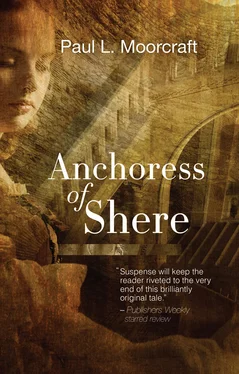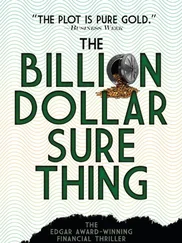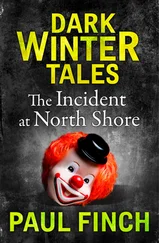Paul Moorcraft - The Anchoress of Shere
Здесь есть возможность читать онлайн «Paul Moorcraft - The Anchoress of Shere» весь текст электронной книги совершенно бесплатно (целиком полную версию без сокращений). В некоторых случаях можно слушать аудио, скачать через торрент в формате fb2 и присутствует краткое содержание. Жанр: Триллер, на английском языке. Описание произведения, (предисловие) а так же отзывы посетителей доступны на портале библиотеки ЛибКат.
- Название:The Anchoress of Shere
- Автор:
- Жанр:
- Год:неизвестен
- ISBN:нет данных
- Рейтинг книги:4 / 5. Голосов: 1
-
Избранное:Добавить в избранное
- Отзывы:
-
Ваша оценка:
- 80
- 1
- 2
- 3
- 4
- 5
The Anchoress of Shere: краткое содержание, описание и аннотация
Предлагаем к чтению аннотацию, описание, краткое содержание или предисловие (зависит от того, что написал сам автор книги «The Anchoress of Shere»). Если вы не нашли необходимую информацию о книге — напишите в комментариях, мы постараемся отыскать её.
The Anchoress of Shere — читать онлайн бесплатно полную книгу (весь текст) целиком
Ниже представлен текст книги, разбитый по страницам. Система сохранения места последней прочитанной страницы, позволяет с удобством читать онлайн бесплатно книгу «The Anchoress of Shere», без необходимости каждый раз заново искать на чём Вы остановились. Поставьте закладку, и сможете в любой момент перейти на страницу, на которой закончили чтение.
Интервал:
Закладка:
“Have you ever seen this woman, please? She lived in Shere.”
Duval’s manner changed a little. He opened the door a few inches wider, and he was a touch more polite. Mark noted the nuances.
After Duval had looked at the leaflet for a few seconds, he said, “No, I’m sorry. I’ve not seen her.”
“Thank you for your time. May I leave a leaflet with you? If you do hear or see anything, please contact any of the numbers listed…There is a reward.”
Mark had said the same phrases a thousand times. Too late, he realised it was inappropriate to say this to a Catholic priest, so he covered his awkwardness by adding: “Not that you would be motivated by money, sir, but perhaps you would mention it to your parishioners.”
“Yes, of course.” Duval was a little taken aback; not many people knew of his religious vocation in Shere, but the priest managed a smile. “And Merry Christmas to you,” he added. Mark thanked him and took his leave. The door closed quickly behind him.
As he walked slowly down the steps Mark decided that he would visit Duval again. He stopped by the gate, spending deliberately long seconds lighting a cigarette in hands cupped against the wind, his eyes taking in every detail of the house. As he walked back to the village he wondered whether his desperation was making him look for villains in the wrong places, seeing even priestly academics as suspects. But he had to act on any lead, any clue, anything at all. He thought Duval was lying. It was in his eyes. But a Catholic priest? Mark started to worry about his own mental state. Maybe he was going over the top because he had given himself just one more week in Shere. He had to return to his regiment soon: he couldn’t test his commanding officer’s patience too much.
That night in the White Horse, after he had recounted the day’s events, Mark asked the professor to tell him more about the reclusive priest. The officer realised that, in intelligence terms, he was breaking cover, but he had always relied upon his instincts, not manuals of fieldcraft. Gould was a good man, he knew. Mark had always liked the openness of Americans, at least those he had met in professional life. And he needed a mate to talk to-he was surprised how much he missed the camaraderie of the officers’ mess.
“Tell me about this priest of yours,” Mark said bluntly.
“Can’t say much more than what I’ve already told you. He’s had one or two undistinguished articles in the Bulletin of the Institute of Historical Research, and there’s a small book published by the loopy medievalists in Exeter; he had an essay in there on Julian of Norwich. This stuff is really only for the specialists.”
“But why do you think he’s so unfriendly towards you? If there are so few specialists why isn’t he interested in another one?”
“Could be rivalry. Local historians get very protective about their patches. And academic historians specialise in back-stabbing and being bitchy. They argue about university politics like crazy because usually the stakes are so low. And we all get paid zilch so we’re mostly bitter and twisted old so-and-sos. But he’s also a priest. They can be crabby, especially having to do without women.”
That last sentence tripped a switch in Mark’s clouded, unhappy mind.
“A man without a woman, living in a secluded place. It’s a recipe for mischief. Look at the navy…”
The American laughed. “Hell, don’t jump to dopey conclusions, Mark. He may be an oddball, but why should you connect him with your sister? I did notice that he’s a pipe-smoker who breaks his matches in two and puts them back in the box. Supposed to be a sign of suppressed aggression. But that’s not a hanging offence, Mark. You can’t run around accusing priests of…whatever.”
The professor didn’t want to say murder, although that’s what he meant.
“I am convinced she’s still alive, and I intend to find her. I may be clutching at straws, but if this mysterious Duval character has anything to hide, I’ll find it.”
Gould looked at him warily. “Forget it, Mark. I told you, I’ve met him, and he’s an innocuous medieval buff. A priest, remember.”
“Yes, you’re right. I’m just frustrated about going back with bugger all. C’mon. It’s Christmas. Let’s have another drink.”
Mark went off to buy a round. He didn’t want to annoy his new friend by pressing him on the priest, but a seed had been planted and now it was germinating. Impulsively, he asked the barman if he knew Father Duval.
“Well, lots of people come in ’ere, not sure if I know him, but you could try in the Prince of Wales up the road.”
Mark bought the man a drink and tried again. The drink obviously helped.
“I’m not sure of his name,” said the barman, “but there is a fellow who comes in sometimes with his dog. It’s said he’s a Catholic priest, but he don’t wear his religious gear in here. Sits by there,” he said, pointing, “and has a quiet pint. Don’t bother people. Bit of a loner. Lives up at the old rectory, I believe. Lives on his own, so they say. But you could ask Jim over at the shop. He knows who does what and where roundabout ’ere. But it won’t have nuthin’ to do with your sister, though, if he’s a priest an’ all that.”
The next morning Mark discovered from the shopkeeper that a few months back Father Duval’s food order had increased. “Said he had an aunt visiting when I mentioned it. I thought it was strange because he’s been ordering the same thing for years,” said the shopkeeper, in the slightly conspiratorial tone in which village gossips specialise. “And he started ordering cigarettes, even though he smokes a pipe. Nothing odd there, lots of people smoke both. But when I mentioned it, he stopped coming in here, except for the very occasional thing. Must have upset him. Don’t like doing that to my customers.”
Mark left after thanking him again for putting up a leaflet in his window.
Next he called into the newsagent and contrived to find out what Duval read, using his easy charm to persuade the young female assistant to check the order book. Mark discovered that the priest was a new customer for newspaper delivery: The Times daily and, recently, the New Musical Express weekly. The officer made a quip about the priest being an ageing beatnik. The young lady was thanked and invited “sometime” for a drink in the White Horse. It was a typical English invitation-sometime meant never. Mark was too busy trying to reconcile the strange combination of reading matter in which Duval indulged.
The captain resolved to go again to Duval’s house to confront him, on the pretext of asking whether the priest would take some more leaflets and leave them in his church; upon reflection, he thought better of it, because it was too obvious. He needed time to think, but he wondered whether Marda had time. He had discounted the idea of her going off on walkabout. There was no way that she would have done that to their parents. Amnesia, despite the detective yarns, was extremely rare. And nobody had been found. The only chance she was still alive was that she was somehow being kept against her will…somewhere. He knew he was chasing after phantoms of his own imagination, but he had to do something.
That night Gould tried to solve his problem. “I’m sure that Duval is not your man,” said the professor. “Sure, he’s weird, but he’s an intellectual. We’re all weird.”
“If you think you’re weird, you should meet some of the senior officers in my regiment.”
“Seriously, Mark, maybe I can find a way of asking, obliquely, about him when I see the Bishop of Guildford later on this week-Friday in fact. Bishop Templeton should know something of the priest, it’s his diocese. The bishop isn’t a historian, but he’s fairly switched on to church architecture in the area, so I wrote to him from the States to arrange a meeting.”
Читать дальшеИнтервал:
Закладка:
Похожие книги на «The Anchoress of Shere»
Представляем Вашему вниманию похожие книги на «The Anchoress of Shere» списком для выбора. Мы отобрали схожую по названию и смыслу литературу в надежде предоставить читателям больше вариантов отыскать новые, интересные, ещё непрочитанные произведения.
Обсуждение, отзывы о книге «The Anchoress of Shere» и просто собственные мнения читателей. Оставьте ваши комментарии, напишите, что Вы думаете о произведении, его смысле или главных героях. Укажите что конкретно понравилось, а что нет, и почему Вы так считаете.












